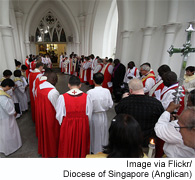A statement posted issued by Lutherans Concerned/North America on its website dated April 11 read: "This weekend, the ELCA [Evangelical Lutheran Church in America] Church Council meeting in Chicago moved the decision of the 2009 Churchwide Assembly into policy by replacing the language in church documents that excluded ministers in committed same-gender relationships with a policy that allows congregations and organizations to call a fully-qualified minister in a committed, same-gender relationship. And, the Council also approved the way to reinstate ministers who have been removed from the roster because of the previous policy and to receive ELM pastors onto the roster of the ELCA. The Council also made the benefits of the ELCA pension plan available to rostered ministers and employees in committed, same-gender relationships."

The 2009 Churchwide Assembly adopted "Human Sexuality: Gift and Trust" as the ELCA's tenth social statement.
Rev Dr Cindi Love, the new executive director of Soulforce, an advocacy group that is working to end religious and political oppression of LGBT people, wrote in The Huffington Post on April 19: "The Lutherans have made a crack in the dam of religious bigotry that is now set to break wide open for the rest of the fundamentalist world – we are at a tipping point."
"The ELCA has conducted itself with grace and dignity, and many of us are longing for some of that type of public civility. Their example is going to make people within other embattled denominations long for a better process within their own communities. The ELCA members didn't wage war in public with one another. There was no public outcry that diminished everyone while they worked their way through a quarter century of discussion."

Meanwhile on the other side of the world, some 130 leaders of the Global South Anglican Communion which comprises churches in more than 20 countries in Africa, Asia and Latin America are gathered in Singapore for a five-day meeting from April 19-23, to discuss the future of the Church and the Anglican Covenant – a document aimed at preventing a split in the Anglican Communion.
Episcopal Life Online reports that among those participating in the meeting are some conservative Episcopal Church bishops and leaders of breakaway groups such as the Anglican Church in North America, which has disaffiliated itself from the established provinces in North America to seek "spiritual care" from Anglican Provinces and leaders in Kenya, Nigeria, Rwanda, South America and Uganda.
While the term 'Global South' was more commonly used to refer to the Christian population of the developing world, the Anglican Global South is today a grouping of twenty of the thirty-eight provinces of the Anglican Communion. The term is said to have come into use in 2003 as a result of the dispute caused by the ordination of Rev Gene Robinson – an openly gay non-celibate priest – as a bishop in the Episcopal Church in the United States. "Increasingly, it becomes a target used by disaffected Church of England clerics for canvassing worldwide Anglican rebellion against Archbishop of Canterbury Dr Rowan Williams," wrote Michael Nai, director and Asian Christianity coordinator of the Centre for the Study of Christianity in Asia, Trinity Theological College in a 2008 paper titled 'The Global South Anglican: its origins and development' citing several other publications.
The Archbishop of Rwanda, Rev Emmanuel Kolini on Tuesday called for a new Anglican Ecumenical Council saying that the American Episcopal Church and the Anglican Church in Canada are heretical because they have stepped over the line in faith and morals and should no longer be considered part of, or having a voice in the affairs of the Anglican Communion, reported VirtueOnline which describes itself as the 'Voice for Global Orthodox Anglicanism.'
The website also reported that delegates are expected to discuss the impact the consecration of Rev Mary Glasspool, a non-celibate lesbian as bishop next month will have on the Anglican Communion. The American branch of the Anglican Communion is known as the Episcopal Church (TEC). David W. Virtue wrote on VirtueOnline: "The incremental innovations of TEC and the Anglican Church of Canada have been the subject of discussion for over a decade, but many believe this might be the end of the road for provinces that do not conform to Scripture on matters of human sexual behavior."
The Singapore Straits Times on Tuesday quoted Archbishop Mouneer Anis, who heads the Province of Jerusalem and the Middle East, as saying that he hoped the meeting would persuade Dr Williams [Archbishop of Canterbury] to "discipline churches which have gone the wrong way", adding that the issues of gay clergy and same-sex unions were "the only things keeping the global Anglican community from coming together".
Archbishop of Canterbury and spiritual head of the 77 million Anglicans worldwide, Dr. Rowan Williams was not present at the meeting but spoke to delegates via a pre-recorded video message on Tuesday.
The Global South Primates Steering Committee comprises Rev Peter J. Akinola, Nigeria (Chairman); Rev Emmanuel Kolini, Rwanda (Vice-Chairman); Rev John Chew, Southeast Asia (General Secretary); Rev Mouneer Anis, Jerusalem and the Middle East (Treasurer); Rev Stephen Than Myint Oo, Myanmar and Bishop Albert Chama, Dean of Central Africa.
